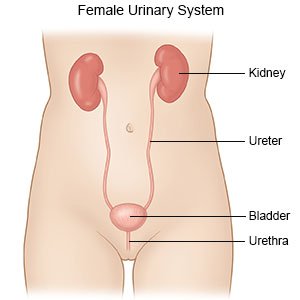WHAT YOU NEED TO KNOW:
A urinary tract infection (UTI) is caused by bacteria that get inside your urinary tract. Most bacteria that enter your urinary tract come out when you urinate. If the bacteria stay in your urinary tract, you may get an infection. Your urinary tract includes your kidneys, ureters, bladder, and urethra. Urine is made in your kidneys, and it flows from the ureters to the bladder. Urine leaves the bladder through the urethra. A UTI is more common in your lower urinary tract, which includes your bladder and urethra.
 |
Seek care immediately if:
- You are urinating very little or not at all.
- You have a high fever with shaking chills.
- You have side or back pain that gets worse.
Call your doctor if:
- You have a fever.
- You do not feel better after 2 days of taking antibiotics.
- You are vomiting.
- You have questions or concerns about your condition or care.
Medicines:
- Antibiotics help fight a bacterial infection. If you have UTIs often (called recurrent UTIs), you may be given antibiotics to take regularly. You will be given directions for when and how to use antibiotics. The goal is to prevent UTIs but not cause antibiotic resistance by using antibiotics too often.
- Medicines may be given to decrease pain and burning when you urinate. They will also help decrease the feeling that you need to urinate often. These medicines will make your urine orange or red.
- Take your medicine as directed. Contact your healthcare provider if you think your medicine is not helping or if you have side effects. Tell him or her if you are allergic to any medicine. Keep a list of the medicines, vitamins, and herbs you take. Include the amounts, and when and why you take them. Bring the list or the pill bottles to follow-up visits. Carry your medicine list with you in case of an emergency.
Follow up with your healthcare provider as directed:
Write down your questions so you remember to ask them during your visits.
Prevent another UTI:
- Empty your bladder often. Urinate and empty your bladder as soon as you feel the need. Do not hold your urine for long periods of time.
- Wipe from front to back after you urinate or have a bowel movement. This will help prevent germs from getting into your urinary tract through your urethra.
- Drink liquids as directed. Ask how much liquid to drink each day and which liquids are best for you. You may need to drink more liquids than usual to help flush out the bacteria. Do not drink alcohol, caffeine, or citrus juices. These can irritate your bladder and increase your symptoms. Your healthcare provider may recommend cranberry juice to help prevent a UTI.
- Urinate after you have sex. This can help flush out bacteria passed during sex.
- Do not douche or use feminine deodorants. These can change the chemical balance in your vagina.
- Change sanitary pads or tampons often. This will help prevent germs from getting into your urinary tract.
- Talk to your healthcare provider about your birth control method. You may need to change your method if it is increasing your risk for UTIs.
- Wear cotton underwear and clothes that are loose. Tight pants and nylon underwear can trap moisture and cause bacteria to grow.
- Vaginal estrogen may be recommended. This medicine helps prevent UTIs in women who have gone through menopause or are in peri-menopause.
- Do pelvic muscle exercises often. Pelvic muscle exercises may help you start and stop urinating. Strong pelvic muscles may help you empty your bladder easier. Squeeze these muscles tightly for 5 seconds like you are trying to hold back urine. Then relax for 5 seconds. Gradually work up to squeezing for 10 seconds. Do 3 sets of 15 repetitions a day, or as directed.